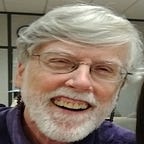Is Darkness Bad? No way!
Friends and others lament these “dark times,” meaning for them one or all of these: the ugliness of Trumpism and our politics in general; and the scourges of three Pandemics — Covid-19, racism and White supremacy, and economic despair and devastation for too many even before the virus struck.
I share this lament, but not the negative value associated with the this usage of “dark.”
As one who feels at home in the dark, the phrase “dark times” troubles me. There is so much that is good about darkness — whether it be darker-pigmented people or the underland where fungi and other creatures deepen and extend life in the soil or even the overland beauty of leafless trees in winter against the night sky. Or what about the things we learn as the result of “being in the dark” and the feeling of revelation, sometimes even elation, when we see what we had missed before?
I experience darkness as almost always a gift, a break from the light pollution to which we are exposed every day. For example, there is more than enough light created by our neighbors and us in our small court of co-op homes as we leave our porch lights on at night to discourage criminals from breaking in. We also live across the street from city hall, the community center, and the library, which are overlaid with light each night.
When I go outside at 5:00 or 5:30 a.m. to meditate and pray, all this light, not to mention the noise of twin-interstate highways and a local parkway that meet just outside our town, reduce the number and brightness of stars visible in the sky and compete with the chorus of cicadas.
Often it feels to me life is an unending contest where light keeps trying to overcome, even erase, dark. And light wins all the time — a system of light supremacy to which our society is addicted. Why can’t we accept, and celebrate, the reality that there is life, good life, in darkness, and that we can learn from its multitude of gifts?
White racism, White supremacy, is a good place to start. Despite the beauty, strength and resilience of darker-skinned people even in the most ugly times, Western Civilization insists on the primacy of Euro-American positive valuation of light and the negative valuation of dark.
In the United States, we connect White Supremacy with the subjugation and domination of African peoples. And yet, coupled with an Enlightenment mindset — namely the value of the rational over the mystical, the scientific over the intuitive and artistic, and the valorization of the individual (often to pursue their own interests over the well-being of community), White Supremacy supports and sustains the subjugation and domination of other groups as well.
For example, Arab learning — at one time the zenith of mathematical and scientific reasoning and knowledge in the world — was discounted to justify Christian crusades against Muslim people. That same strain of Christian imperialism and the belief that Western (northern European) ideas, culture and systems are the apex of human achievement unite in capitalism and colonialism to undergird and justify the conquest of indigenous people in the Americas as well as the importation and breeding of slaves for the profit of their owners.
A central method of the capitalist/settler colonialism drive to subdue and own land and all it contains is to label the wisdom and practices of indigenous people as primitive, without value in the modern world. Thus, today we can see not only how African Americans and Spanish-speaking peoples from Latin America continue to be oppressed, but also how the Middle East, other than Israel, is viewed as backward, and even nations and peoples further east are the victims of negativity.
Further, this intersecting series of belief systems produce the subjugation of nature, degradation and elimination of species, and denial of what is happening in the Climate Crisis. As Robin Wall Kimmerer writes in Braiding Sweetgrass: Indigenous Wisdom, Scientific Knowledge, and the Teachings of Plants, non-indigenous people are trained to devalue the teaching of nature.
In short, “we” have created a worldview that highlights only some parts of reality and casts the rest into the dark — not listening to BIPOC people; not paying attention to that which makes life possible for all, namely the earth and all its parts; and refusing to build a world in which all have what they need to thrive (rather than some having far more than they need and too many not having even enough to survive).
Thus, I believe we must begin the practice of Endarkenment, to value not only things that appear dark but also the wisdom we have cast into the dark. In future posts, I will discuss this concept but suffice it to say at this point that I believe if we continue to refuse to acknowledge and accept and even celebrate the equal partnership of dark and light, we, and certainly our children and grandchildren and their children, are doomed.
These are not “dark times” but they are times of pain, anxiety, injustice, and crisis — and thus times of challenge and opportunity to radically change our ways to save us all.
